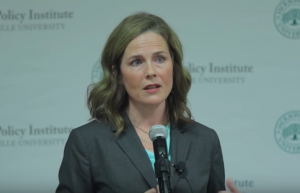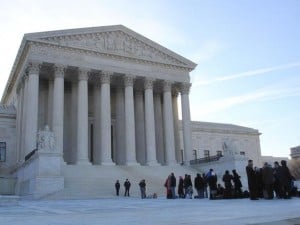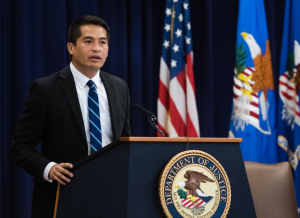Tag: Judicial Nominations
-
 Courts, Supreme Court
Courts, Supreme CourtMeet The 5 Finalists For President Trump's Next Supreme Court Nomination
And check out the odds on each of them getting the nod. -
 Courts
CourtsShocking No One, ABA Thinks Biglaw ASSOCIATE Not Ready For Federal Bench
Senate leapfrogs ABA 'not-qualified' candidate in mad dash to get a vote.  Sponsored
SponsoredTrust The Process: How To Build And Manage Workflows In Law Firms
If you’re feeling inefficient but don’t know why, this episode of the Non-Eventcast is for you.-
 Courts
CourtsLatest Trump Judicial Nominee Clerked LAST YEAR
They're just trolling the country at this point.
-
 Non-Sequiturs
Non-SequitursNon Sequiturs: 05.05.19
* If you shared my skepticism that the murder trial in the Dan Markel case will actually start next month, almost five long years after Markel’s murder, then you won’t be surprised by this latest development — Saam Zangeneh, counsel to Sigfredo Garcia, has moved for a continuance. [Tallahassee Democrat]
* As predicted, President Donald Trump just had his 100th Article III federal judge confirmed by the U.S. Senate; he’s now up to 102 judicial appointees, as noted by Carrie Severino. [Bench Memos / National Review]
* If my writeup of Preet Bharara’s recent event at Cleary Gottlieb left you wanting more, check out Randy Maniloff’s wide-ranging interview with the former U.S. attorney (including advice on how not to get hired at the S.D.N.Y.). [Coverage Opinions]
* Jonathan Adler flags a thoughtful debate between Michael McConnell and Josh Chafetz on the battle over subpoenas between President Trump and Congressional Democrats. [Volokh Conspiracy / Reason]
* Howard Wasserman identifies an interesting argument against police officers using body-worn cameras aka bodycams — but as he also observes, we don’t really have a better solution yet to the abuse of police discretion. [PrawfsBlawg]
* My money’s on Capital Loss Carryover in the Preakness Stakes. [TaxProf Blog]
* Of course “real lawyers” take notes — but there are some nuances here, which Joel Cohen explores. [New York Law Journal]
* Frank Cross, a longtime professor of law at the University of Texas School of Law, rest in peace. [Balkinization]
-
 Courts
CourtsAn Insider's Perspective On President Trump's Transformation Of The Federal Judiciary
Mike Davis, former Chief Nominations Counsel to former Senate Judiciary Chairman Chuck Grassley, played a key role in the confirmation process. -
 Non-Sequiturs
Non-SequitursNon Sequiturs: 04.28.19
* Adam Feldman poses — and answers — an interesting question: are particular justices more or less partial to certain lawyers’ or law firms’ positions? [Empirical SCOTUS]
* Speaking of the federal judiciary, Carrie Severino offers this helpful scorecard of President Donald Trump’s track record on judicial appointments — which underscores, as she notes, the importance of the 2020 elections. [Bench Memos / National Review]
* And speaking of President Trump, Joshua Matz and Laurence Tribe have this excellent explanation of why the Supreme Court does not have a role in adjudicating impeachments. [Take Care]
* In the wake of the Mueller Report, Ilya Somin pushes back against conventional wisdom and takes this position: “Not all foreign interference in elections is unjustified. Far from it, in fact.” [Volokh Conspiracy / Reason]
* Fair use in the copyright context is an infamously amorphous concept — so the Fourth Circuit’s recent ruling in Brammer v. Violent Hues Productions deserves your attention. [All Rights Reserved]
* Congratulations to Westlaw Edge, voted the “best new analytics product” by the readers of Dewey B Strategic. [Dewey B Strategic]
* And congrats to Kira Systems on being picked by Bryan Cave Leighton Paisner as its AI solution for “high-volume workstreams” across the firm. [Artificial Lawyer]
* If you’re a libertarian-leaning lawyer with two to six years of experience under your belt, check out these great employment opportunities over at IJ. [Institute for Justice via Volokh Conspiracy / Reason]
-
 Non-Sequiturs
Non-SequitursNon Sequiturs: 04.21.19
* What’s the future of Elizabeth Prelogar, the beauty queen turned Harvard Law School grad turned Supreme Court clerk turned Team Mueller member? Not clear, except that it’s blindingly bright. [Ozy]
* How often do you see this? A federal judge praises counsel — specifically, J. Christian Adams of the Election Law Center, Douglas R. Cox of Gibson Dunn, Michael E. Rosman of the Center for Individual Rights, and local counsel Mun Su Park — for their “conscientious billing practices.” [Volokh Conspiracy / Reason]
* Another Lawyerly Lair of Jonathan Schiller, of Boies Schiller Flexner fame: a stunning modern retreat on Martha’s Vineyard, designed by his son, architect Aaron Schiller (whose firm also did the new BSF offices in Hudson Yards). [Martha’s Vineyard]
* Amicus brief of the month: a compelling — and, sadly, entertaining (see the Appendix) — analysis of the U.S. Patent and Trademark Office’s utterly incoherent approach to supposedly “immoral or scandalous” trademarks, filed by William Jay and Goodwin Procter on behalf of law professors Barton Beebe and Jeanne Fromer. [Supreme Court of the United States]
* Here’s a clear and concise explanation of the “Rule of 80,” taking “senior status” as a federal judge, and what this all means for the ideological balance of the judiciary, courtesy of Ed Whelan. [Bench Memos / National Review]
* How should we think about President Donald Trump’s branding of the press as “the enemy of the people”? Negatively, to be sure — but let’s also keep in mind that the media is not a monolith, as First Amendment lawyer Charles Glasser helpfully reminds us. [Daily Caller]
* Stephen Cooper survived a stabbing — then went on to defend violent criminals for many years as a federal public defender. [Alabama Political Reporter]
* Cooper argues that we need to be less punitive and more thoughtful in our treatment of offenders — and Joel Cohen seems to agree, defending an unusual but wise sentence recently handed down by Judge Valerie Caproni (S.D.N.Y.). [New York Law Journal]
-
 Non-Sequiturs
Non-SequitursNon Sequiturs: 03.24.19
* In the wake of Justice Anthony M. Kennedy’s retirement, I predicted that Chief Justice John Roberts, a staunch institutionalist when it comes to the Supreme Court, would serve as a moderating influence at SCOTUS — and so far that seems to be the case, with Adam Feldman noting a “a mild liberalizing over time” in JGR’s jurisprudence. [Empirical SCOTUS]
* Speaking of SCOTUS, it’s high time for the Court to resolve the messy circuit split on email privacy under the Stored Communications Act, according to Orin Kerr. [Volokh Conspiracy / Reason]
* The Trump Administration’s new executive order about free speech on university campuses might harm rather than help the cause of academic freedom, as Paul Horwitz points out. [PrawfsBlawg]
* Republicans aren’t the only ones with purity tests for judicial nominations; Demand Justice, a left-wing group focused on the federal judiciary, has high standards for Democratic opposition to Trump nominees. [Bench Memos / National Review]
* While you wait for the 2019 edition of Above the Law’s law school rankings, check out the latest installment of the “revealed preferences” law school rankings, by C.J. Ryan and Brian L. Frye. [SSRN]
* What’s next for Kira Systems, a leader in the world of legal AI? Co-founder and CEO Noah Waisberg isn’t resting on his laurels — and he’s putting that $50 million investment from last September to work. [Artificial Lawyer]
* Fastcase continues to forge new partnerships — and in its latest alliance, it will give its subscribers access to select titles from the American Bar Association (which, full disclosure, published my book (affiliate link) in 2014). [Dewey B Strategic]
* If you’ll be in New York this coming Wednesday, consider attending the inaugural Kenneth P. Thompson ’92 Lecture on Race and Criminal Justice Reform at NYU Law School, focused on wrongful convictions and the roles of prosecutors and others in the criminal justice system. [NYU Law]
 Sponsored
SponsoredHow Savvy Lawyers Build Their Law Firm Rate Sheet
Many attorneys are clueless. Here's how you can avoid being one of them.-
 Non-Sequiturs
Non-SequitursNon Sequiturs: 03.10.19
* “I Thought I Could Be A Christian And Constitutionalist At Yale Law School. I Was Wrong.” So writes Aaron Haviland, a 3L at Yale Law School. [The Federalist]
* But if you can survive YLS as a conservative, you might thrive in the world beyond — just ask Senator Josh Hawley (R-Mo.), who’s now a powerful voice on judicial nominations. [Bench Memos / National Review]
* How often does the Notorious RBG see a brief citing the Notorious BIG? Check out this fun read, filed in the Supreme Court on behalf of a constellation of hip-hop stars represented by Alex Spiro and Ellyde Thompson of Quinn Emanuel. [Supreme Court of the United States via New York Times]
* Yes, I’ve been on a hiatus from Twitter — and maybe I’m on to something, if you agree with Stephen Cooper. [Spectator]
* “For your information,” Georgia trial judges, “the Supreme Court has roundly rejected prior restraint.” [Volokh Conspiracy / Reason]
* Retired Judge Nancy Gertner (D. Mass.) believes that U.S. sentencing needs reform — but Paul Manafort’s case is far from the ideal vehicle for it. [Washington Post]
* Congratulations to Fastcase on its latest alliance, this time with credit-reporting giant TransUnion. [Dewey B Strategic]
* And congrats to Neota Logic on its new Dashboard feature, which sounds nifty. [Artificial Lawyer]
-
 Non-Sequiturs
Non-SequitursNon Sequiturs: 02.10.19
* Irina Manta, a recent addition to the roster of Volokh Conspirators, assesses some of the attacks leveled against D.C. Circuit nominee Neomi Rao. [Volokh Conspiracy / Reason]
* In other nomination news, Thomas Jipping explains why conservatives should temper their excitement over those 44 judicial nominees who just got reported out of the Senate Judiciary Committee. [Bench Memos / National Review]
* Michael Dorf’s take on Chief Justice John Roberts joining the four liberals on the Supreme Court to put the Louisiana abortion law on hold: the right to an abortion is “not in quite as much immediate danger as one might have thought. And that’s not nothing.” [Take Care]
* Lawyer to the stars Alex Spiro, partner at Quinn Emanuel, talks about how he’s approaching the representation of his latest celebrity client, rapper 21 Savage. [Complex]
* On the occasion of his 15th blogiversary (congratulations!), Rick Garnett reflects on the past and future of blogging. [Mirror of Justice via PrawfsBlawg]
* Jean O’Grady chats with Pablo Arredondo of Casetext about the platform’s newest features. [Dewey B Strategic]
* And in other legal technology news, congrats to legal AI innovator Luminance on securing another $10 million in funding (reflecting a total valuation for the company of $100 million). [Artificial Lawyer]
* Last Thursday, Alabama executed Domineque Hakim Marcelle Ray and did not allow his imam to be present (even though Christian inmates can have the prison chaplain present) — a manifest injustice, according to Stephen Cooper. [Alabama Political Reporter]
* In the latest installment of his ongoing series offering advice to trial lawyers, David Berg sets forth an essential rule of cross-examination. [YouTube]
-
 Non-Sequiturs
Non-SequitursNon Sequiturs: 02.03.19
* How have personnel changes at the Supreme Court affected the dynamics at oral argument? Adam Feldman offers this analysis. [Empirical SCOTUS]
* Ed Whelan expresses relief over the White House’s new slate of Ninth Circuit nominations. [Bench Memos / National Review]
* Can President Trump declare a “national emergency” in order to build his beloved wall? The National Emergencies Act is not a blank check, according to Brianne Gorod. [Take Care]
* Should Congress pass a “deepfakes” law? Orin Kerr has some concerns. [Volokh Conspiracy / Reason]
* What’s going on with Rudy Giuliani? Joel Cohen has a theory. [The Hill]
* Jean O’Grady is pleased to see all the competition in the legal analytics space (with Precedent Analytics from Thomson Reuters as the newest entrant) — but she’d like to see more support for the competing claims of the different products. [Dewey B Strategic]
* News organizations need stricter and better guidelines when interviewing mentally ill defendants, according to former public defender Stephen Cooper. [The Tennessean]
* Have questions about the fast-approaching February bar exam? Ashley Heidemann has answers. [JD Advising]
-
 Morning Docket
Morning DocketMorning Docket: 02.01.19
* King & Spalding expended a lot of effort to make the Super Bowl the most soulless corporate event of the year. [Daily Report Online]
* “Iowa prison porn” is a three-word phrase I never thought I’d have to string together. [Courthouse News Service]
* Trump lays out more appellate nominees with paper trails full of racist stuff about voting rights, so 2019’s off to a rousing start. [National Law Journal]
* Bar Association to seriously study litigation funding. [Law360]
* Defense Distributed gets smacked around by federal courts. [Ars Technica]
* El Chapo wants your sympathy. [Time]
-
 Non-Sequiturs
Non-SequitursNon Sequiturs: 01.27.19
* Regarding the nomination of Patrick Bumatay to the Ninth Circuit, “Why are Democrats fighting the judicial nomination of a qualified gay minority?” Good question! [The Federalist]
* Speaking of highly qualified minority nominees under attack, Carrie Severino argues that it’s the critics of D.C. Circuit nominee Neomi Rao, not Rao herself, who are being inflammatory. [Bench Memos / National Review]
* And KC Johnson, reviewing the collegiate writings by Rao that have generated the attacks against her, argues that Rao’s views on campus sexual assault — from 25 years ago, so who knows whether or not she still holds them — are “align[ed] both with statute and today’s mainstream opinion.” [City Journal]
* Litigation over a watchdog commission for handling complaints of prosecutorial misconduct in New York State involves a lot of legal luminaries, including Jim Walden and Jacob Gardener of Walden Macht, Jim McGuire and Daniel Sullivan of Holwell Shuster & Goldberg, and Andrew Rossman, Kathleen Sullivan, and Alex Spiro of Quinn Emanuel. [New York Law Journal]
* Could Nick Sandmann and the Covington boys file libel lawsuits over some of the commentary on their controversy? It could be an uphill climb, according to Eugene Volokh (a First Amendment expert, and hardly anyone’s idea of a leftist). [Reason / Volokh Conspiracy]
* But if Covington cases do get filed, they could give rise to some interesting issues of civil procedure, as Howard Wasserman notes. [PrawfsBlawg]
* Many lessons can be learned from the Fyre Festival debacle — and one of the legal ones is that FTC disclosures actually matter. [All Rights Reserved]
* If you’re a liberal or progressive appellate litigator interested in taking on the Trump Administration, check out this new job posting from the good folks at the CAC. [Constitutional Accountability Center]
Sponsored

How To Build And Manage Your Law Firm Rate Sheet

Not All Legal AI Is Created Equal


A Law Firm Checklist For Successful Transaction Management

Sponsored

How Savvy Lawyers Build Their Law Firm Rate Sheet

Trust The Process: How To Build And Manage Workflows In Law Firms
-
 Non-Sequiturs
Non-SequitursNon Sequiturs: 01.06.19
* It’s baaack: partisan gerrymandering returns to the Supreme Court — and in the view of veteran SCOTUS watcher Amy Howe, it’s unlikely that the justices will duck the merits this time around. [SCOTUSblog]
* Article III standing and the Stored Communications Act: Orin Kerr argues that it should be viewed through the lens of property rather than privacy. [Volokh Conspiracy / Reason]
* Carrie Severino calls out Senate Democrats for their persistent — and in her view, unjustified — questioning of judicial nominees about their religious views and affiliations. [Bench Memos / National Review]
* Joel Cohen identifies an interesting issue: should a defendant prejudiced by government misconduct in a case receive a break at sentencing? [Law & Crime]
* Here are some highlights from Chief Justice John Roberts’s year-end report on the federal judiciary, courtesy of Howard Wasserman. [PrawfsBlawg]
* The new year is a time of beginnings — and endings. Concurring Opinions, you will be missed. [Concurring Opinions]
-
 Courts
CourtsA Look Inside The Conservative Judge-Making Machine
When it comes to transforming the federal judiciary, what is the secret to the Republicans' success? -
 Non-Sequiturs
Non-SequitursNon-Sequiturs: 10.21.18
* Orin Kerr offers his thoughts on the Allison Jones Rushing controversy (aka how young is too young to be a federal judge). [Reason / Volokh Conspiracy]
* If President Trump and Senate Republicans are packing the courts with conservatives, then it’s time for Democrats to pack back, according to Michael Klarman. [Take Care]
* Howard Wasserman offers some insights into the recent dismissal of Stormy Daniels’s defamation lawsuit against Trump. [PrawfsBlawg]
* And while we’re on the subject of media law, Gerard Magliocca has an interesting observation about Justice Ruth Bader Ginsburg and the right of publicity. [Concurring Opinions]
* Speaking of RBG, Jonathan Adler argues that she could learn a thing or two from her newest colleague, Justice Brett Kavanaugh, when it comes to hiring law clerks. [Bench Memos / National Review]
* Joel Cohen raises an intriguing question about prosecutors: to what degree are they required to fight their own biases? [New York Law Journal]
-
 Courts
CourtsCircuit Court Nominee Worked For Hate Group -- Good Thing We're Not Going To Have A Real Hearing On This One!
An already troubling nomination just got a whole lot worse. -